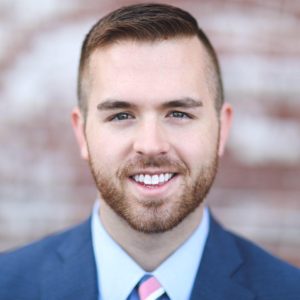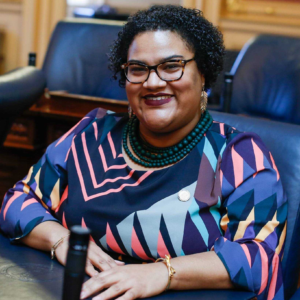Legislator Spotlight: Maine Rep. Ryan Fecteau
 To honor and acknowledge June as LGBT Pride Month, SiX is highlighting the work and leadership on issues affecting LGBT communities with a Member Spotlight of Rep. Ryan Fecteau from Maine. Across the country, state legislators are introducing bans on the practice of so-called “conversion therapy” which seeks to change a person’s gender identity or sexual orientation. Rep. Fecteau championed a conversion therapy ban for minors in Maine this session, which after successful votes in the House and the Senate is still awaiting a few final procedural hurdles to passage.
To honor and acknowledge June as LGBT Pride Month, SiX is highlighting the work and leadership on issues affecting LGBT communities with a Member Spotlight of Rep. Ryan Fecteau from Maine. Across the country, state legislators are introducing bans on the practice of so-called “conversion therapy” which seeks to change a person’s gender identity or sexual orientation. Rep. Fecteau championed a conversion therapy ban for minors in Maine this session, which after successful votes in the House and the Senate is still awaiting a few final procedural hurdles to passage.
Rep. Fecteau lives in Biddeford, Maine, and represents the 11th legislative district in the Maine House of Representatives. SiX recently spoke to him about his work to ban exposing minors to conversion therapy, a cruel and outdated practice that seeks to change one’s sexual orientation. Watch Rep. Fecteau’s speech on the House floor about his personal connection to the legislation here.
What originally made you want to run for office?
I discovered the power of change making and grassroots advocacy when I was a senior in high school. Biddeford High School was, quite literally, falling apart. There was water infiltration, an entire facade leaking energy, and furniture purchased in the 1960s. The city council was considering a $34 million renovation bond proposal and it needed approval from a majority of Biddeford voters. So, though I would not ultimately benefit from the proposal's passage, I led fellow students in a campaign to show our community what it was like to go to a school in disrepair. The proposal earned the support of two out of three voters in Biddeford.
In 2014, I graduated from The Catholic University of America in Washington, D.C., and decided to run for the open state house seat in Biddeford. I did so with seniors and young people in mind. Maine is one of the oldest states in the nation. And while our population grows older, too many young people, including many of my friends, leave for opportunities elsewhere. Young people leaving has consequences for seniors. The state funds health coverage, prescription drug cost reduction, heating assistance, and much more for our seniors. In order to fund such programs, there needs to be a population that is working and contributing to the wellbeing of our entire citizenry. As a 21-year-old at the time of my first election, I felt like I could bring a unique perspective to solving these issues in a legislature with an average age of 55.
What have you found was the most unexpected or rewarding part about becoming a legislator?
It was certainly not unexpected, because I discovered it knocking doors and talking to voters over the phone during the election: the human connection. I have the opportunity every single day to be a champion for the people in my community. There is nothing more rewarding than helping someone solve a problem or propel their solution.
You have been working to ban conversion therapy in Maine. Why is this an important issue to you? Tell us about sharing your personal story on the House floor.
In 2012, I met with a school administrator, a man I trusted, about my work with a student group to combat the high rates of suicide by LGBTQ youth. We had met many times before, but this time the tone shifted dramatically. “Suicide affects everyone, not just LGBTQ people,” the administrator declared, as though the student LGBT group’s argument that administrators should support its existence to help combat the higher rates of rejection-fueled suicide in the LGBTQ community was divisive. He abruptly continued, “One day, I hope you’ll see beyond your gay identity and take in what life has to offer you.” I was stunned into silence. The administrator added, “I recommend you read Beyond Gay by David Morrison.”
I left the meeting, sprinted across campus to my friends, and together we Google-searched the book. The description was a gut punch. My confidence in this administrator evaporated and was replaced by feelings of fear and self-loathing. The recommended book encouraged “reparative therapy,” otherwise known as so-called “conversion therapy.” I wrote in an email to a friend, “I spent the next night crying. I am not one to shed tears often, let alone cry hysterically. Yet on this night, the night before returning home for summer break, I cried hysterically in the arms of my friends.”
I returned to the university in the fall and continued to lead the student LGBTQ organization. I carried the weight of that earlier meeting and struggled with mental exhaustion. Winter break arrived and my dad came to pick me up. Looking out the window, as trees flew by on the highway, I, for the first time in my life, contemplated my continued existence. I had this internal discussion, almost as if there were two voices, concerning whether or not I ought to be alive. It tormented me for the duration of winter break. I was an openly gay young man who was finding my way in life, who had found the guts to come out to my parents, and the confidence to lead a LGBTQ student organization, become student body president, and work as paid staff on a marriage equality campaign. But I could not shake the self-hatred, unworthiness and haunting message that I was broken after this trusted university administrator told me, in essence, to seek “reparative therapy”—to be “beyond gay.”
I spent a long time denying that I had this experience. There is nothing more painstaking than to admit that you’ve contemplated suicide. It was only something I had said aloud to someone a few times before presenting this bill to my colleagues in Augusta. I am so lucky and grateful to have persevered with the help of so many other supportive persons in my life. I am so thankful to be in Augusta, as a state legislator, to advocate for the bill, because I know there are young people who are far more vulnerable than I was back then. I want to protect them from the harm that would come from a trusted professional telling them, one way or another, that they are broken, that the core truth of who they are is wrong and even disgusting.
What reaction did you receive for sharing your story?
I was overwhelmed by words of encouragement from my colleagues in the House. Unfortunately, the tone of the floor debate overall was bitter. It was the most gut-wrenching day I've experienced as a legislator. At one point, a Republican lawmaker declared gay people performed "unnatural acts." It concluded with a completely partisan vote.
What additional issues are you most passionate about?
I am passionate about career and technical education. The days of funneling every high school student into a “college or bust” mentality must end, especially in Maine. We have industries where workers are quickly nearing retirement age. One of the issues I heard on the campaign trail in 2016 most often was, "I can't get a plumber to do this small job." There are good-paying industries with huge needs. Maine is lucky to have 16 career and technical education schools connected to our high schools. Unfortunately, we have not made a statewide investment in these schools since 1998. I've sponsored legislation to do so.
Anything else you would like readers to know? What's a fun fact about yourself readers may not know?
I have this awesome four-legged daughter named Pancake and she is waiting for her chance to succeed me in the legislature.
Follow Pancake and Rep. Fecteau on Facebook at @Fecteau4Biddeford and Twitter at @Fecteau4Biddeford.
